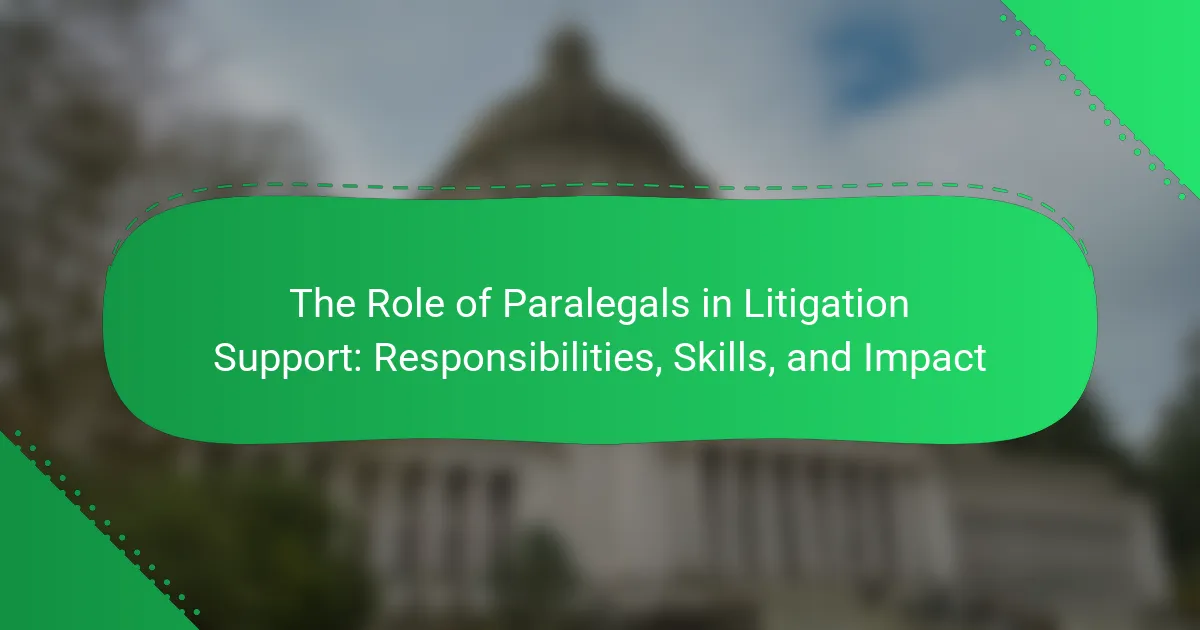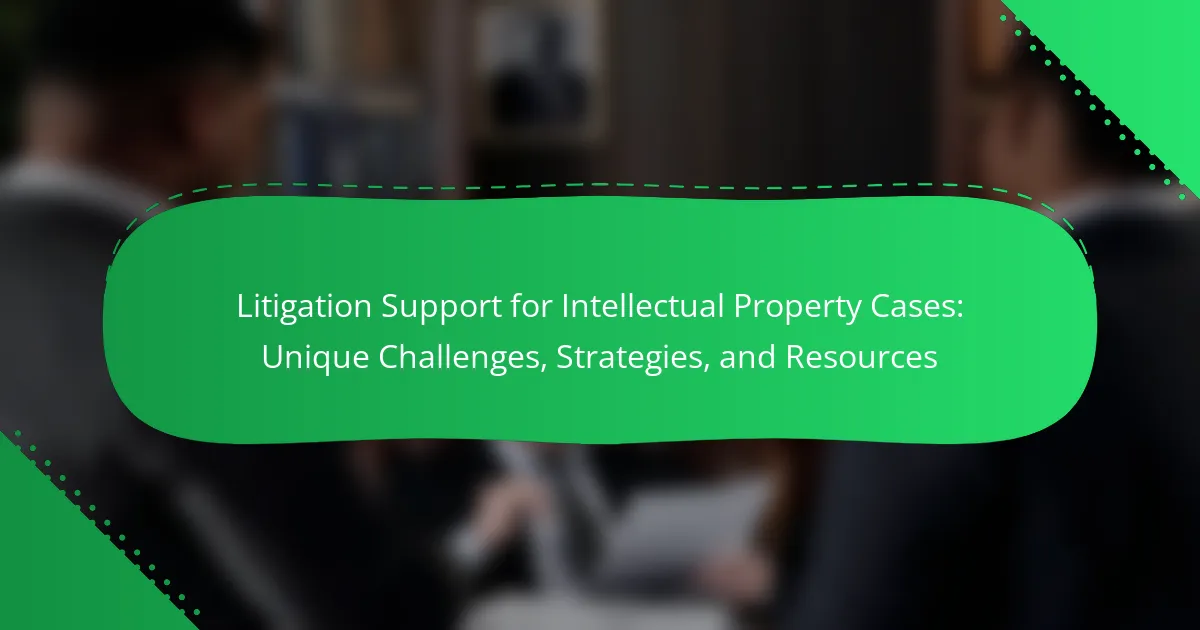Paralegals are essential professionals in litigation support, assisting attorneys with various responsibilities that enhance the efficiency of the legal process. Their tasks include conducting legal research, preparing legal documents such as pleadings and motions, managing case files, and communicating with clients and witnesses. Paralegals also play a vital role in trial preparation by organizing exhibits and evidence, which allows attorneys to focus on case strategy and representation. Their expertise in research, communication, and organization significantly improves case management and contributes to favorable litigation outcomes, as evidenced by higher client satisfaction rates in firms that utilize their support.

What is the Role of Paralegals in Litigation Support?
Paralegals play a crucial role in litigation support by assisting attorneys in various tasks. They conduct legal research to gather relevant case information. Paralegals also prepare legal documents such as pleadings and motions. They manage case files to ensure all documents are organized and accessible. Communication with clients and witnesses is another important duty. Paralegals may also assist in trial preparation by organizing exhibits and evidence. Their support enhances the efficiency of the legal process. According to the National Association of Legal Assistants, paralegals significantly reduce the workload of attorneys, allowing for more effective case management.
How do paralegals contribute to the litigation process?
Paralegals contribute to the litigation process by providing essential support to attorneys. They conduct legal research to gather relevant case law and statutes. This research helps attorneys build strong cases. Paralegals also draft legal documents, such as pleadings and motions, ensuring accuracy and compliance with legal standards. They organize and manage case files, which improves efficiency during litigation. Additionally, paralegals assist in trial preparation by preparing exhibits and witness lists. They may also communicate with clients to gather information and keep them informed. Their contributions enhance the overall effectiveness of the legal team during litigation.
What specific tasks do paralegals perform in litigation support?
Paralegals perform various specific tasks in litigation support. They assist attorneys by conducting legal research to gather relevant case information. Paralegals also draft legal documents, including pleadings and motions. They organize and manage case files to ensure easy access to information. Additionally, they prepare exhibits and evidence for trial presentation. Paralegals often assist in discovery processes by gathering and reviewing documents. They may also communicate with clients and witnesses to gather necessary information. Their support is crucial in maintaining the efficiency and effectiveness of legal proceedings.
How do paralegals assist attorneys in case preparation?
Paralegals assist attorneys in case preparation by conducting legal research and drafting documents. They gather relevant information and evidence to support cases. Paralegals also organize case files, ensuring all materials are accessible. They communicate with clients, witnesses, and experts to obtain necessary information. Additionally, paralegals help prepare attorneys for court by summarizing case details and preparing exhibits. Their support allows attorneys to focus on strategic decision-making. This division of labor enhances efficiency in the legal process.
Why are paralegals essential in legal teams?
Paralegals are essential in legal teams because they enhance efficiency and support attorneys in various tasks. They conduct legal research, draft documents, and manage case files. This support allows attorneys to focus on complex legal issues and client representation. According to the National Association of Legal Assistants, paralegals can save law firms significant time and money. Their skills in organization and communication improve overall workflow. Paralegals also ensure compliance with legal procedures and deadlines, reducing the risk of errors. Their contributions are vital for effective litigation support and client service.
What advantages do paralegals bring to law firms?
Paralegals enhance law firms by increasing efficiency and reducing costs. They handle routine tasks such as legal research and document preparation. This allows attorneys to focus on complex legal matters. Paralegals also improve client communication and case management. Their expertise in legal procedures ensures compliance and accuracy. According to the National Association of Legal Assistants, firms that employ paralegals report higher productivity levels. Their support can lead to quicker case resolutions and better service delivery. Overall, paralegals are vital assets in optimizing law firm operations.
How do paralegals enhance the efficiency of legal practices?
Paralegals enhance the efficiency of legal practices by streamlining operations and reducing workload. They perform essential tasks such as legal research, drafting documents, and managing case files. This allows attorneys to focus on more complex legal issues. Paralegals also assist in preparing for trials, which saves time and resources. Their organizational skills help maintain order in legal documentation. According to the National Association of Legal Assistants, firms that employ paralegals report increased productivity. This results in faster case resolutions and improved client satisfaction. Overall, paralegals are integral to optimizing legal practice efficiency.

What are the Key Responsibilities of Paralegals in Litigation Support?
Paralegals in litigation support are responsible for assisting attorneys in various legal tasks. They conduct legal research to gather relevant case information. Paralegals prepare legal documents, including pleadings and discovery materials. They organize and manage case files to ensure easy access to information. Paralegals also assist in trial preparation by preparing exhibits and witness lists. They may attend depositions and court hearings to provide support. Moreover, paralegals communicate with clients and witnesses to gather necessary information. Their work ensures that attorneys can focus on case strategy and representation.
What are the primary duties of paralegals in litigation?
Paralegals in litigation primarily assist attorneys by conducting legal research, drafting documents, and managing case files. They prepare pleadings and motions for court filings. Paralegals also gather evidence and interview witnesses to support cases. They are responsible for organizing and maintaining case-related materials. Additionally, paralegals may assist in trial preparation by creating exhibits and preparing trial notebooks. They help ensure compliance with legal procedures and deadlines. Their work allows attorneys to focus on strategy and client representation. According to the National Association of Legal Assistants, paralegals significantly enhance the efficiency of legal teams.
How do paralegals manage case files and documentation?
Paralegals manage case files and documentation by organizing, maintaining, and updating legal records. They systematically categorize documents for easy retrieval. Paralegals also ensure compliance with legal standards. They track deadlines and manage timelines for case filings. Digital tools assist paralegals in maintaining organized electronic files. They often use case management software for efficiency. Regular audits of files help ensure accuracy and completeness. Effective communication with attorneys is essential for managing documentation.
What role do paralegals play in legal research?
Paralegals assist attorneys by conducting legal research. They gather relevant case law, statutes, and regulations. Paralegals analyze legal documents to support case preparation. They summarize findings for attorneys, highlighting key points. Paralegals also ensure that legal research complies with current laws. Their work enhances the efficiency of legal teams. According to the National Association of Legal Assistants, paralegals play a critical role in litigation support. This involvement helps attorneys build stronger cases.
How do paralegals interact with clients and witnesses?
Paralegals interact with clients and witnesses primarily through communication and support. They conduct interviews to gather information relevant to cases. Paralegals also assist clients in understanding legal processes and documentation. They often prepare clients for depositions and court appearances. Additionally, paralegals may follow up with witnesses to gather further insights or clarify statements. They maintain confidentiality and professionalism in all interactions. Effective communication skills are essential for building rapport with clients and witnesses. This interaction is crucial for gathering evidence and supporting the legal team effectively.
What responsibilities do paralegals have in client communication?
Paralegals have several responsibilities in client communication. They serve as a liaison between clients and attorneys. Paralegals gather information from clients to assist in case preparation. They communicate case updates and important information to clients. Paralegals also help clients understand legal processes and terminology. They ensure that client inquiries are addressed promptly and professionally. Additionally, paralegals maintain confidentiality in all communications. These responsibilities are vital for effective client relations and case management.
How do paralegals prepare witnesses for trial?
Paralegals prepare witnesses for trial by conducting thorough interviews. They gather relevant information about the case from the witnesses. Paralegals also help witnesses understand the trial process. They explain what to expect during testimony. Additionally, they provide guidance on how to answer questions clearly. Paralegals may conduct mock examinations to practice responses. This preparation helps witnesses feel more confident. Effective witness preparation can improve the overall presentation of the case.

What Skills are Necessary for Paralegals in Litigation Support?
Paralegals in litigation support require strong research skills. They must efficiently gather and analyze legal information. Effective communication skills are also essential. Paralegals must convey complex information clearly to attorneys and clients. Organizational skills are crucial for managing case files and documentation. Attention to detail helps avoid errors in legal documents. Familiarity with legal software enhances their ability to manage case information. Knowledge of legal terminology is necessary for accurate communication. These skills contribute to the overall efficiency of the litigation process.
What technical skills should paralegals possess?
Paralegals should possess strong research skills, proficiency in legal software, and excellent writing abilities. Research skills enable paralegals to find relevant case law and statutes efficiently. Proficiency in legal software, such as case management systems and document automation tools, is essential for managing files and documents. Excellent writing abilities are crucial for drafting legal documents and correspondence clearly and accurately. Familiarity with e-discovery tools is also important for managing electronic evidence in litigation. Additionally, understanding legal terminology and procedures enhances their effectiveness in supporting attorneys. These technical skills are vital for paralegals to perform their roles effectively in litigation support.
How does proficiency in legal software benefit paralegals?
Proficiency in legal software enhances paralegals’ efficiency and accuracy in their tasks. It allows them to manage case files effectively and streamline document preparation. Legal software provides tools for research, enabling paralegals to find relevant case law quickly. This proficiency reduces the time spent on administrative tasks, allowing paralegals to focus on substantive legal work. Furthermore, it minimizes errors in documentation, which is crucial in legal settings. According to the National Association of Legal Assistants, proficiency in technology is essential for modern paralegals to remain competitive in the job market. This skill set directly impacts the quality of support they provide to attorneys and clients.
What research skills are important for paralegals?
Paralegals require strong research skills to effectively support litigation. Key skills include legal research proficiency, which allows them to locate relevant case law and statutes. They must also excel in using legal databases like Westlaw and LexisNexis. Analytical skills are crucial for interpreting legal documents and understanding complex information. Attention to detail ensures accuracy in gathering and organizing data. Additionally, they need effective communication skills to convey findings clearly. These skills collectively enhance their ability to assist attorneys in building strong cases.
What soft skills enhance a paralegal’s effectiveness?
Effective paralegals possess strong communication skills, which allow them to convey information clearly. They also demonstrate critical thinking, enabling them to analyze complex legal issues. Organizational skills are crucial for managing case files and deadlines efficiently. Attention to detail ensures accuracy in legal documents and research. Adaptability helps paralegals respond to changing case dynamics. Strong interpersonal skills facilitate collaboration with attorneys and clients. Time management is essential for balancing multiple tasks and meeting deadlines. Lastly, problem-solving skills empower paralegals to address challenges proactively. These soft skills collectively enhance a paralegal’s effectiveness in supporting litigation processes.
Why is communication crucial for paralegals?
Communication is crucial for paralegals because it ensures effective collaboration within legal teams. Paralegals often serve as a bridge between attorneys, clients, and other professionals. Clear communication helps in understanding client needs and legal requirements. It also facilitates the accurate gathering and sharing of information. Effective communication reduces the risk of misunderstandings in legal documents and processes. Moreover, strong communication skills enhance client relationships and foster trust. According to a survey by the National Association of Legal Assistants, 85% of paralegals believe that communication is key to their success in the legal field.
How do organizational skills impact a paralegal’s performance?
Organizational skills significantly enhance a paralegal’s performance. These skills enable paralegals to manage case files efficiently. Effective organization reduces the risk of errors in legal documentation. It also streamlines communication among team members. Research shows that paralegals with strong organizational abilities complete tasks faster. This leads to improved overall productivity in legal settings. Additionally, well-organized paralegals can prioritize tasks effectively. This ensures that deadlines are met consistently in litigation processes.

What is the Impact of Paralegals on Litigation Outcomes?
Paralegals significantly enhance litigation outcomes. Their involvement leads to improved case management and efficiency. Studies show that cases with paralegal support often resolve faster than those without. Paralegals conduct thorough research and prepare essential documents. This preparation reduces errors and increases the likelihood of favorable rulings. Additionally, their assistance allows attorneys to focus on strategy and client interaction. According to the National Association of Legal Assistants, firms utilizing paralegals report higher client satisfaction rates. Overall, paralegals play a crucial role in achieving successful litigation results.
How do paralegals influence case management and outcomes?
Paralegals significantly influence case management and outcomes through their organizational skills and legal knowledge. They assist attorneys by conducting legal research and drafting documents. This support helps streamline case preparation and enhances efficiency. Paralegals also manage case files and deadlines, ensuring timely submissions. Their attention to detail reduces the risk of errors in legal documents. Additionally, they communicate with clients and witnesses, facilitating information gathering. This role fosters better case strategies and outcomes. Studies indicate that firms utilizing paralegals often experience improved case resolution rates and client satisfaction.
What metrics can measure the effectiveness of paralegals in litigation?
Metrics that can measure the effectiveness of paralegals in litigation include case turnaround time, accuracy of documentation, and client satisfaction ratings. Case turnaround time indicates how quickly paralegals can process and manage cases. A shorter turnaround time often reflects higher efficiency and effectiveness. Accuracy of documentation assesses the quality of work produced by paralegals. High accuracy rates contribute to successful case outcomes. Client satisfaction ratings provide insights into how well paralegals meet the needs and expectations of clients. Positive feedback from clients demonstrates the value of paralegals in the litigation process. Additionally, the number of cases handled per paralegal can indicate productivity levels. Collectively, these metrics provide a comprehensive view of paralegal effectiveness in litigation.
How can paralegals improve client satisfaction in legal services?
Paralegals can improve client satisfaction in legal services by enhancing communication and efficiency. They serve as a bridge between clients and attorneys. This role allows them to clarify client needs and expectations. Paralegals can provide timely updates on case progress. This transparency fosters trust and reassurance for clients. Additionally, their organizational skills streamline case management. Efficient handling of documents and deadlines reduces delays. A study by the American Bar Association found that improved communication leads to higher client satisfaction rates. Paralegals’ proactive approach in addressing client concerns further contributes to positive experiences.
What are the best practices for paralegals in litigation support?
Best practices for paralegals in litigation support include thorough case preparation and effective communication. Paralegals should organize case files meticulously to ensure easy access to documents. They must maintain clear communication with attorneys and clients to facilitate information flow. Conducting comprehensive legal research is essential for supporting case strategies. Paralegals should also be proficient in using legal technology for document management and analysis. Timeliness in meeting deadlines is critical to avoid delays in litigation processes. Staying updated on legal procedures and regulations enhances their effectiveness. Finally, paralegals should uphold ethical standards and confidentiality in all interactions. These practices contribute to a well-functioning litigation support system.
How can paralegals stay updated with legal trends and changes?
Paralegals can stay updated with legal trends and changes by subscribing to legal journals and newsletters. These publications provide insights into recent case law and legislative updates. Attending legal seminars and workshops also helps paralegals gain knowledge directly from experts in the field. Online courses and webinars are increasingly popular for ongoing education. Networking with legal professionals through associations offers access to valuable resources and discussions. Utilizing social media platforms can facilitate real-time updates on legal developments. Following relevant legal blogs keeps paralegals informed about emerging trends. Engaging in continuous professional development is essential for maintaining expertise.
What strategies can paralegals use to enhance their professional development?
Paralegals can enhance their professional development through continuous education and networking. Engaging in specialized training programs improves their legal knowledge and skills. Attending legal seminars and workshops provides exposure to current trends and practices. Joining professional organizations fosters connections with other legal professionals. Seeking mentorship from experienced attorneys offers guidance and insights into career advancement. Participating in online forums and discussion groups enhances understanding of complex legal issues. Additionally, obtaining certifications in specific areas of law can increase job opportunities and credibility. These strategies collectively contribute to a paralegal’s growth and effectiveness in the legal field.
The primary entity of this article is paralegals, who serve a critical role in litigation support. The article outlines their key responsibilities, including conducting legal research, drafting documents, managing case files, and assisting in trial preparation. It highlights the essential skills required for paralegals, such as communication, organization, and legal research proficiency, while also discussing their impact on litigation outcomes and client satisfaction. Additionally, best practices for paralegals and strategies for professional development are examined to enhance their effectiveness within legal teams.



